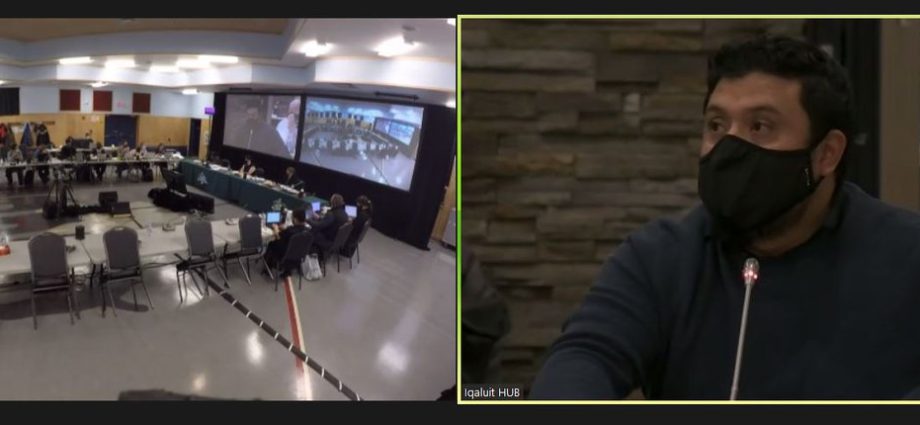
By David Venn, Local Journalism Initiative Reporter, Nunatsiaq News
January 28, 2021
In a public hearing to address concerns about a proposed mine expansion — which is expected to have immense effects on Inuit culture and way of life — opponents have been restricted in asking questions, or excluded. On the hearing’s fourth day, some frustrated intervenors called the process unconstitutional, “insulting” and “unacceptable.”
Critics of the Baffinland Iron Mines Corp.’s proposed railway and dock expansion at its Mary River mine have been held to three questions per round since Wednesday morning, when the board announced it was already a full day behind schedule. Members of the Mittimatalik Hunters and Trappers Organization say they have been excluded from asking questions altogether.
As a result, community leaders say Inuit are being left behind in the discussions. The Nunavut Impact Review Board’s hearing began Monday to consider Baffinland’s request to expand the mine, a move it says is necessary to make it financially sustainable.
“Inuit should not walk away from this meeting not knowing and not understanding the impacts of this project on their families, on their hunting grounds, on their rights. They shouldn’t, but they’re being forced to,” Igloolik mayor Merlyn Recinos said, before walking out of the board room in Pond Inlet Thursday.
Nunavut Impact Review Board executive director Karen Costello told Nunatsiaq News the board “is unable to address questions from the media on matters that are actively before it,” but added that the community roundtable, scheduled for next week, is when Inuit Qaujimajatuqangit, or traditional knowledge, is typically shared.
Amanda Hanson Main, technical adviser for the Mittimatalik Hunters and Trappers Organization, said the board has a constitutional obligation to be the conduit for Inuit and government, stemming from Canada’s largest land claims agreement.
The board’s mandate comes from the Nunavut Land Claims Agreement. One section refers to public hearings specifically and instructs the board to “emphasize flexibility and informality” during hearings and “give due regard and weight to the tradition of Inuit oral communication.”
Recinos and Lori Idlout, technical adviser for the Ikajutit Hunters and Trappers Organization, criticized the board during an open forum Thursday. Both argued Baffinland routinely deferred its answers to specific documents — documents that could be located in a registry of over 1,000.
“Our communities do not have the capacity and capability that [Baffinland] does. We have continued to talk about the amount of documents that are on the record for this proposal. And a lot of it is misinterpreted,” said Recinos, who then walked out of the room.
Others, such as Chris Debicki, vice-president of policy development for Oceans North, says he has received multiple non-answers.
Baffinland did not respond to a request for comment on the fairness of the proceedings. In two previous requests for comment, Baffinland said it will not comment on the hearing while it is ongoing.
Mittimatalik Hunters and Trappers Organization chairperson Eric Ootoovak said in an email to Nunatsiaq News that the hearing has been “very disrespectful to Inuit culture.”
“Intervenors are very unhappy with the way Inuit are being treated. We thought this process was supposed to be flexible, and allow us to be heard,” he wrote, adding that the pandemic has been challenging for Inuit’s participation in the hearing.
The hearing, which began Monday, is taking place at two hubs — one in Iqaluit and one in Pond Inlet — as well as permitting people to tune in through broadcast, Zoom and teleconference. That has separated communities and made it harder for Inuit to communicate and speak with their elders, Ootoovak said.
“Oral communication is fundamental to Inuit culture,” he said.
Pond Inlet technical adviser Frank Tester, in a phone interview with Nunatsiaq News, described the restrictions on questions and inaccessible materials in conflict with what the board should stand for.
“The Inuit have been forced into a format and a way of dealing with information which is not respectful in and of itself,” said Tester. “We’ve got a format here that is a western process for holding a hearing and deciding what makes sense, in which Inuit have been squeezed or forced.”
At the end of the hearings on Feb. 6, the Nunavut Impact Review Board will send its recommendation, based on the evidence provided during these hearings, to federal Northern Affairs Minister Dan Vandal, who will then make a decision on the expansion.
The Ministry of Crown-Indigenous Relations and Northern Affairs said Inuit must be included in the conversations.
Subscribe to our newsletter.
“The Government believes that members of the communities impacted in the Baffin region must have a meaningful opportunity to make their views known during the Nunavut Impact Review Board’s (NIRB) Final Public Hearing, to inform and influence decisions about this important project,” a spokesperson said in an email to Nunatsiaq News.


